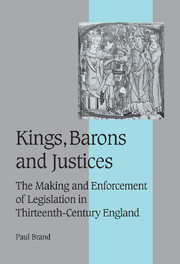Book contents
- Frontmatter
- Contents
- List of tables
- Preface
- List of abbreviations
- INTRODUCTION
- Part I Politics and the legislative reform of the common law: from the Provisions of Westminster of 1259 to the Statute of Marlborough of 1267
- Chapter 1 THE MAKING OF THE PROVISIONS OF WESTMINSTER: THE PROCESS OF DRAFTING AND THEIR POLITICAL CONTEXT
- Chapter 2 THE MAKING OF THE PROVISIONS OF WESTMINSTER: THE SOCIAL AND LEGAL CONTEXT AND THE EVOLUTION OF THE INDIVIDUAL CLAUSES: I
- Chapter 3 THE MAKING OF THE PROVISIONS OF WESTMINSTER: THE SOCIAL AND LEGAL CONTEXT AND THE EVOLUTION OF THE INDIVIDUAL CLAUSES: II
- Chapter 4 THE ENFORCEMENT OF THE PROVISIONS OF WESTMINSTER DURING THE INITIAL STAGE OF THEIR EXISTENCE, 1259–63
- Chapter 5 THE REVISION AND REISSUING OF THE PROVISIONS, 1263–4
- Chapter 6 THE REVISED PROVISIONS IN ACTION, 1263–7
- Chapter 7 THE FINAL REVISION AND REISSUE OF THE PROVISIONS OF WESTMINSTER: THE STATUTE OF MARLBOROUGH OF 1267
- Part II Beyond politics: the enforcement and interpretation of the Statute of Marlborough in the courts, 1267–1307
- Chapter 16 CONCLUSIONS
- Appendix I TEXT AND TRANSLATION OF THE PROVISIONS OF WESTMINSTER OF 1259
- Appendix II TEXT AND TRANSLATION OF THE PROVISIONS OF WESTMINSTER AS REISSUED IN 1263 AND 1264
- Appendix III TEXT AND TRANSLATION OF THE STATUTE OF MARLBOROUGH OF 1267
- Bibliography
- Index
- Cambridge Studies in Medieval Life and Thought Fourth series
Chapter 6 - THE REVISED PROVISIONS IN ACTION, 1263–7
Published online by Cambridge University Press: 16 June 2009
- Frontmatter
- Contents
- List of tables
- Preface
- List of abbreviations
- INTRODUCTION
- Part I Politics and the legislative reform of the common law: from the Provisions of Westminster of 1259 to the Statute of Marlborough of 1267
- Chapter 1 THE MAKING OF THE PROVISIONS OF WESTMINSTER: THE PROCESS OF DRAFTING AND THEIR POLITICAL CONTEXT
- Chapter 2 THE MAKING OF THE PROVISIONS OF WESTMINSTER: THE SOCIAL AND LEGAL CONTEXT AND THE EVOLUTION OF THE INDIVIDUAL CLAUSES: I
- Chapter 3 THE MAKING OF THE PROVISIONS OF WESTMINSTER: THE SOCIAL AND LEGAL CONTEXT AND THE EVOLUTION OF THE INDIVIDUAL CLAUSES: II
- Chapter 4 THE ENFORCEMENT OF THE PROVISIONS OF WESTMINSTER DURING THE INITIAL STAGE OF THEIR EXISTENCE, 1259–63
- Chapter 5 THE REVISION AND REISSUING OF THE PROVISIONS, 1263–4
- Chapter 6 THE REVISED PROVISIONS IN ACTION, 1263–7
- Chapter 7 THE FINAL REVISION AND REISSUE OF THE PROVISIONS OF WESTMINSTER: THE STATUTE OF MARLBOROUGH OF 1267
- Part II Beyond politics: the enforcement and interpretation of the Statute of Marlborough in the courts, 1267–1307
- Chapter 16 CONCLUSIONS
- Appendix I TEXT AND TRANSLATION OF THE PROVISIONS OF WESTMINSTER OF 1259
- Appendix II TEXT AND TRANSLATION OF THE PROVISIONS OF WESTMINSTER AS REISSUED IN 1263 AND 1264
- Appendix III TEXT AND TRANSLATION OF THE STATUTE OF MARLBOROUGH OF 1267
- Bibliography
- Index
- Cambridge Studies in Medieval Life and Thought Fourth series
Summary
THE POLITICAL SETTING AND THE SURVIVING EVIDENCE
Although Henry III faced mounting opposition from January 1263 onwards it was only in July of that year that he was forced to agree to the reinstatement of the regime of conciliar control of governmental machinery that had been created at Oxford in the summer of 1258, to the dismissal of the current royal appointees to the posts of chancellor, justiciar and treasurer and their replacement by new baronial appointees, and to a new measure for the expulsion from England of all aliens except for those whose continued residence was acceptable to the king's subjects. The new regime's hold on power was, however, no more than tenuous. By November the king had once more taken control of his administration and appointed his own candidates to the posts of chancellor, treasurer and chief justiciar. In January 1264 King Louis IX of France, to whom the differences between the king and his opponents had earlier been referred, provided a secular counterpart to the two prior papal condemnations of the Provisions of Oxford and all that followed from them in his pronouncement in the Mise of Amiens. The Mise, like the papal pronouncements, was not acceptable to Simon de Montfort or to other radical opponents of the king and civil war began in April 1264, culminating with baronial victory at the battle of Lewes in May 1264.
- Type
- Chapter
- Information
- Kings, Barons and JusticesThe Making and Enforcement of Legislation in Thirteenth-Century England, pp. 165 - 184Publisher: Cambridge University PressPrint publication year: 2003

